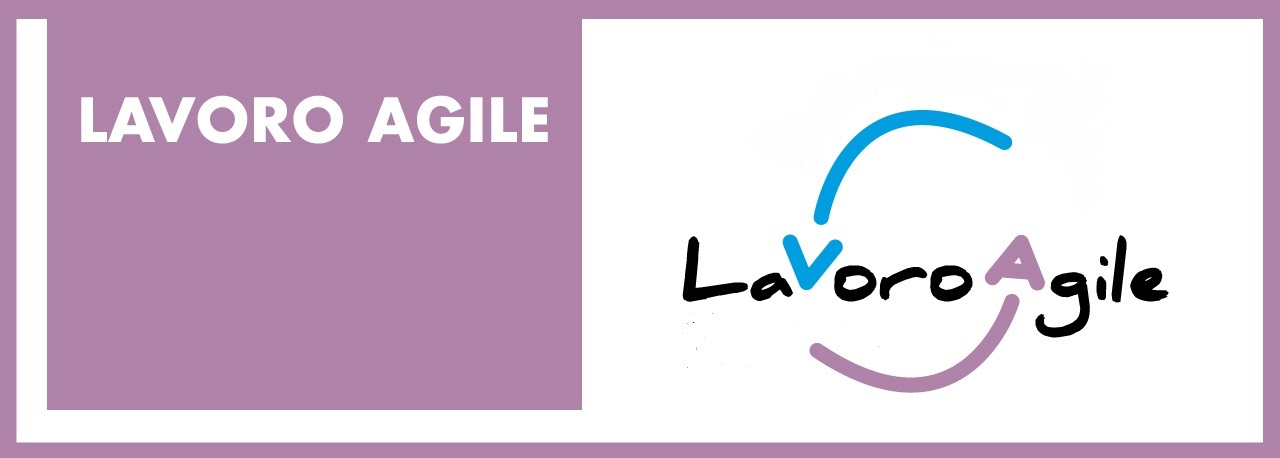
Working smart (Agile working, near working and hourly flexibility)
Even before the COVID-19 pandemic, numerous agile working projects were taking shape in the public and private sector, showing all the advantages of this way of working of which the Municipal Administration has promoted the experimentation for years, both through the Agile Work Week initiative - which in 2019 had reached its third edition, after the Agile Work Days of 2014, 2015 and 2016 - both through the funded projects ("MIRE - Milan online - from welfare to regained time”, which continues the activities of “Smart Lab - Milano Concilia 4.0” as part of the Territorial Conciliation Plan of the Lombardy Region). With the transition from "Day" to "Week" of Agile Work, in addition to the possibility of extending the experimentation to several days, innovative elements had been studied and introduced, proposing that participating companies and organizations share their experience through the organization of events or through a peer mentoring activity from which new businesses, especially small and medium-sized ones, could benefit.
The success of the initiative was confirmed by positive trend in numbers: in the 2019 edition, 53.520 workers were involved, compared to 23.034 in 2018, and 446 companies took part one or more times in the five editions, compared to 408 the previous year. The research carried out - in collaboration with the municipal Agency for Mobility, Environment and Territory, expert in analysis and monitoring in the territory (AMAT) and the Bocconi School of Management - found that, in addition to the time gained for private life, for employees who adopt smart working solutions add increased efficiency, motivation and productivity.
Taking advantage of the experiences conducted on the subject of agile working, the Municipality of Milan, in a phase prior to the health emergency, was carrying out the deployment of smart working gradually throughout its organization involving - following a union discussion and a moment of analysis of the organisation's organizational culture - the interested employees of 9 directions. With implementation starting from approximately 1 July 2019 330 smart workers 3 parents with children up to the eighth year had been given 4 days a month of flexible working.
The arrival of the pandemic and the consequent lockdown therefore did not find the Administration unprepared, allowing in a very short time to more than 7.000 municipal workers to make use of this working method which detaches productivity from physical presence in the office, bringing to light the need for a transformation of the ways and times of work already in place. From the data that emerged from the research conducted by the Administration on Agile Extraordinary Work (LAS), this experience facilitated the acquisition of new skills and favored an increase in productivity.
The one experienced during the lockdown was defined as an experience of Emergency Remote Working (ERW or Extraordinary/Emergency Agile Work, LAS) and not actual smart working: organizations that did not have an ongoing project experimented with agile working in a forced and unstructured way and now, in a phase of containment of the health emergency, accepting the challenge of the work of the future , seek a sustainable balance between presence and remote activities.
The Municipality of Milan - having long been pursuing social and environmental sustainability policies that look at the quality of life of its citizens and city users - in a continuously evolving scenario characterized by a change in the times of the city and of work also following the phase pandemic, proposes, first in Italy, a new model of living and working: a city “15 minutes away”. In this context, it articulates the "smart" working method of its employees with multiple components: in addition to a hybrid smart working model - alternation between remote and presence - a renewed one hourly flexibility and near working, i.e. the possibility of working in municipal offices closer to one's home.
In constant discussion with the trade unions and in agreement with the management of the institution, the Municipality has approved the guidelines and an organizational plan for agile working, which, where it identifies "smart" activities, considers smart working as a complementary modality to work in person, which is also combined with an investment in technological equipment and digital training for the identified employees. This integrated plan aims to improve the organisation's organization and activities, as well as the quality of the services offered, making it more efficient and effective.
Labor Market Unit
Via Larga, 12 – 20122 Milan – 3rd floor
Email: plo.conciliazione@comune.milano.it
- Agile Work Week Results - 2019 (pdf - 3276.896 KB)
- Agile Work Week Results - 2018 (pdf - 3028.725 KB)
- Agile Work Week Results - 2017 (pdf - 1794.58 KB)
- Agile Work Week Results - 2016 (pdf - 3222.592 KB)
- Agile Work Week Results - 2015 (pdf - 2212.612 KB)
- Agile Work Week Results - 2014 (pdf - 2320.741 KB)
Updated: 19/05/2022
